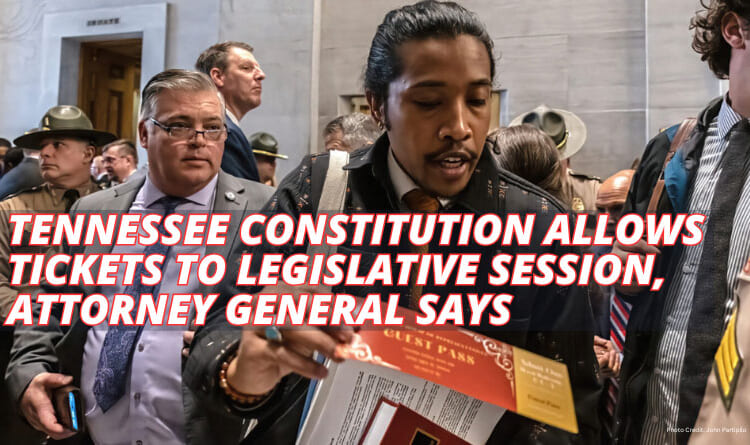Photo: Rep. Justin Jones, D-Nashville, showing off one of the tickets now required for members of the public to access the House of Representatives gallery. Photo Credit: John Partipilo
By Anita Wadhwani [Tennessee Lookout -CC BY-NC-ND 4.0] –
A ticketing system that restricts public access to the Tennessee House of Representatives is allowable under the state’s constitution, according to a legal opinion from Attorney General Jonathan Skrmetti.
House Speaker Cameron Sexton surprised lawmakers and members of the public last month by introducing the new policy, which allocates one ticket for every lawmaker to give to the public during each House session.
In practice, the ticketing system has meant that Tennessee’s super-majority GOP House can control its audience while conducting public business. GOP lawmakers get 75 tickets and Democrats 24, all for the west balcony overlooking the House floor. The east side of the gallery remains open to the media and public.
Sexton has defended the policy against criticism, saying representatives want to ensure visitors they know are arriving have seats, even if they are a few minutes late. He said lawmakers could also share tickets and noted that Congress also has a ticketing system.
Establishing a ticketing system falls within the authority of the General Assembly to regulate and manage access to the Capitol building, the legal opinion, issued last week, said.
According to the opinion, “the Tennessee Constitution contemplates that sessions during which the General Assembly conducts its business will be open to the public, but it does not guarantee the public a right of access to legislative sessions,” it said.
The Tennessee Constitutions says that “doors of each House and of committees of the whole shall be kept open, unless when the business shall be such as ought to be kept secret.”
The ticketing system, the opinion said, “would not run afoul of the “open door” provision of (the Tennessee Constitution) because it would not close the doors to the public; it would merely manage public access to the limited space that is available.”



